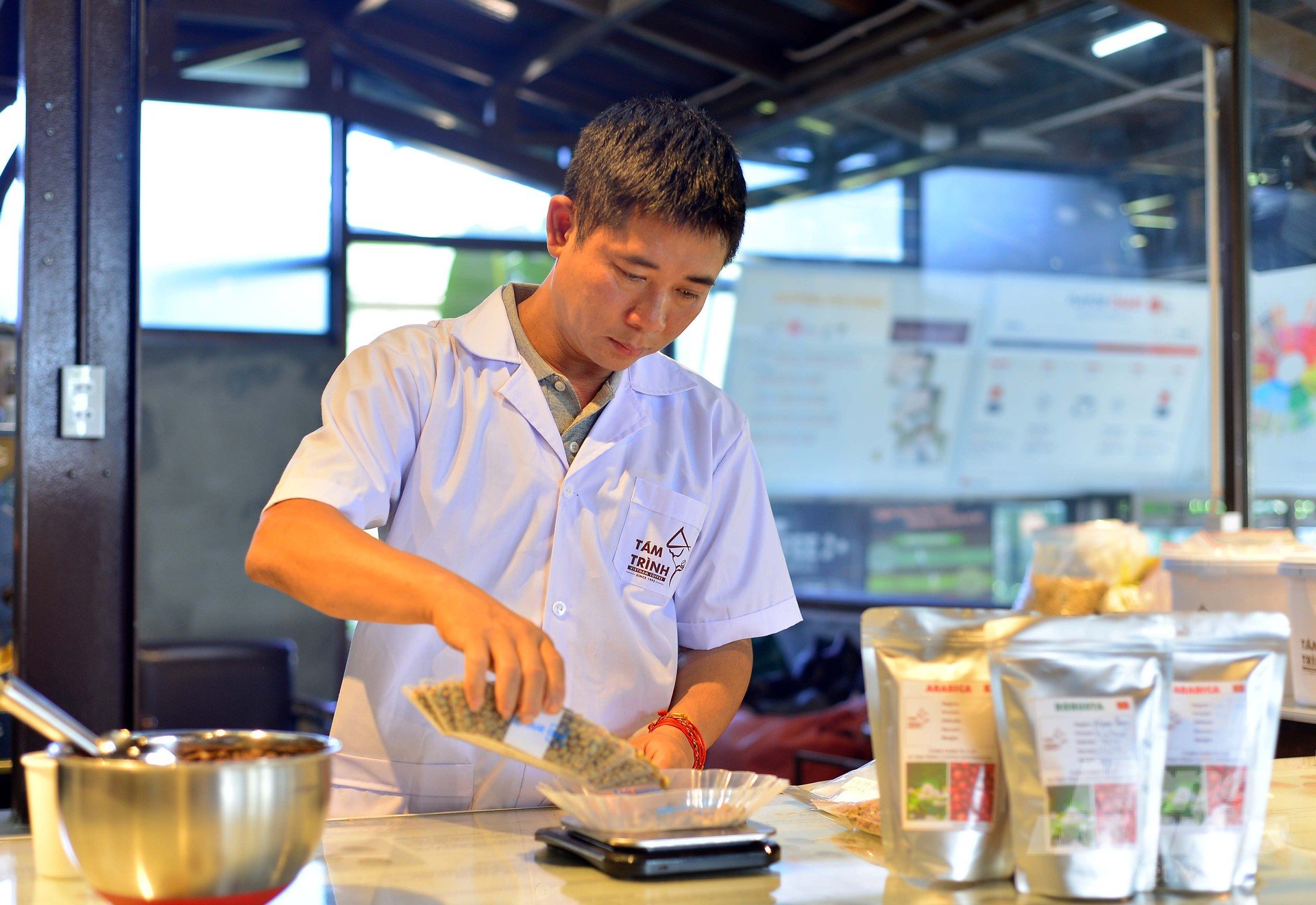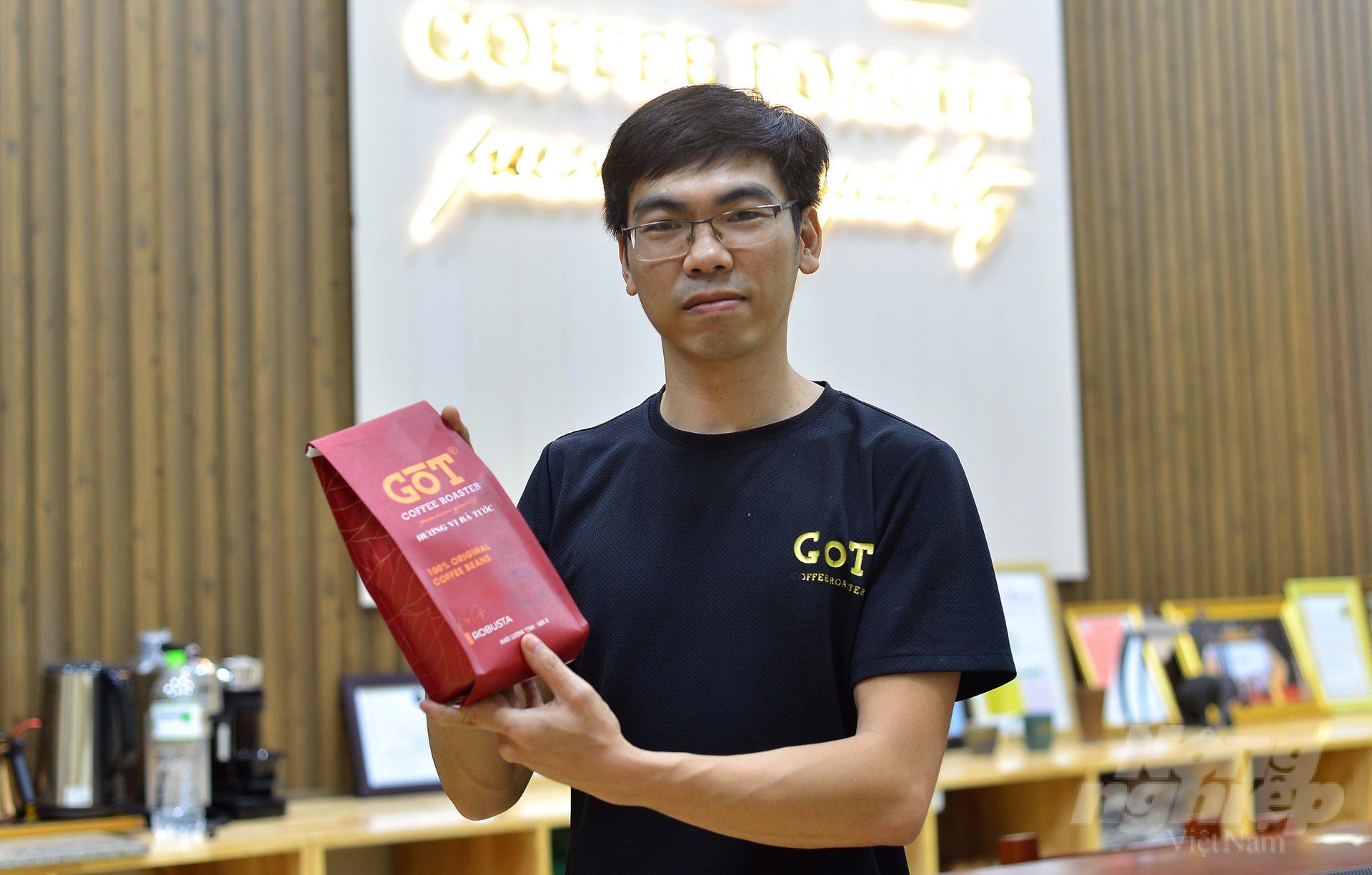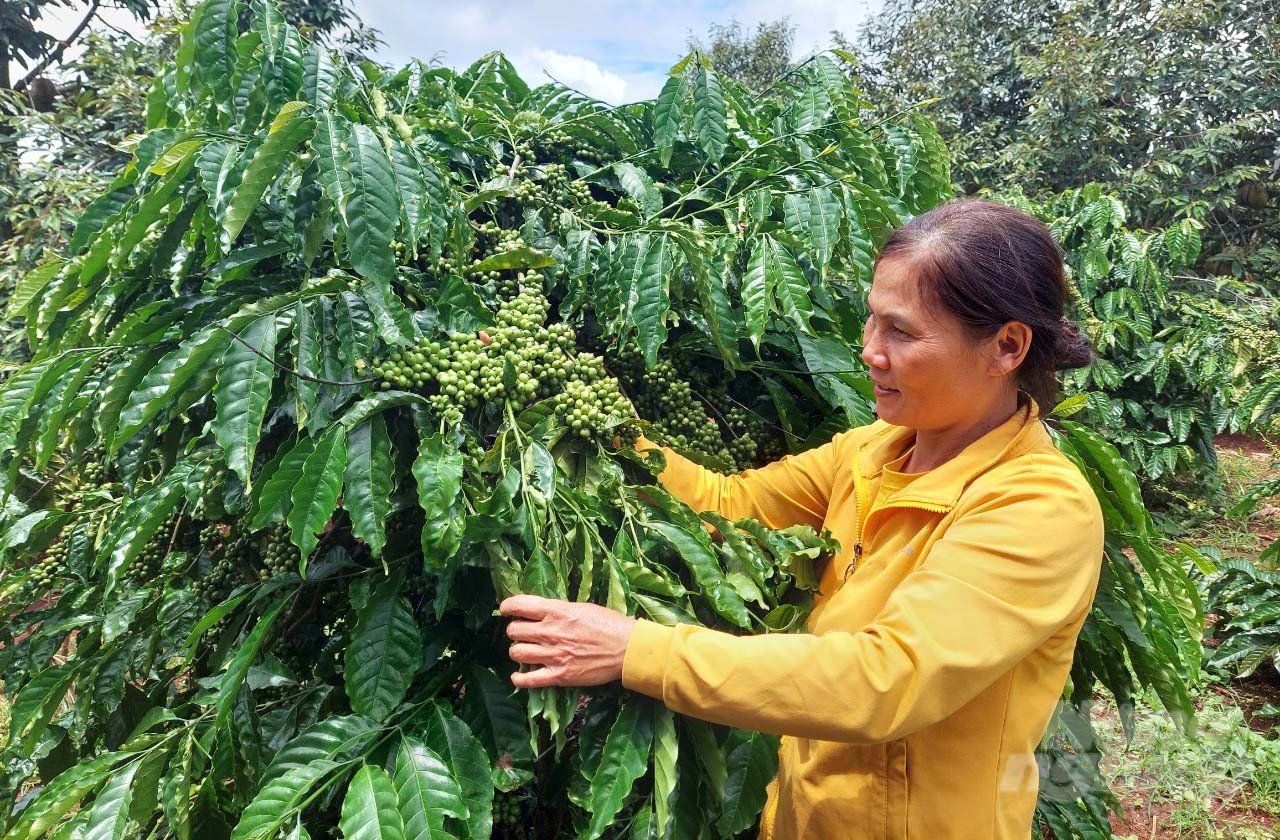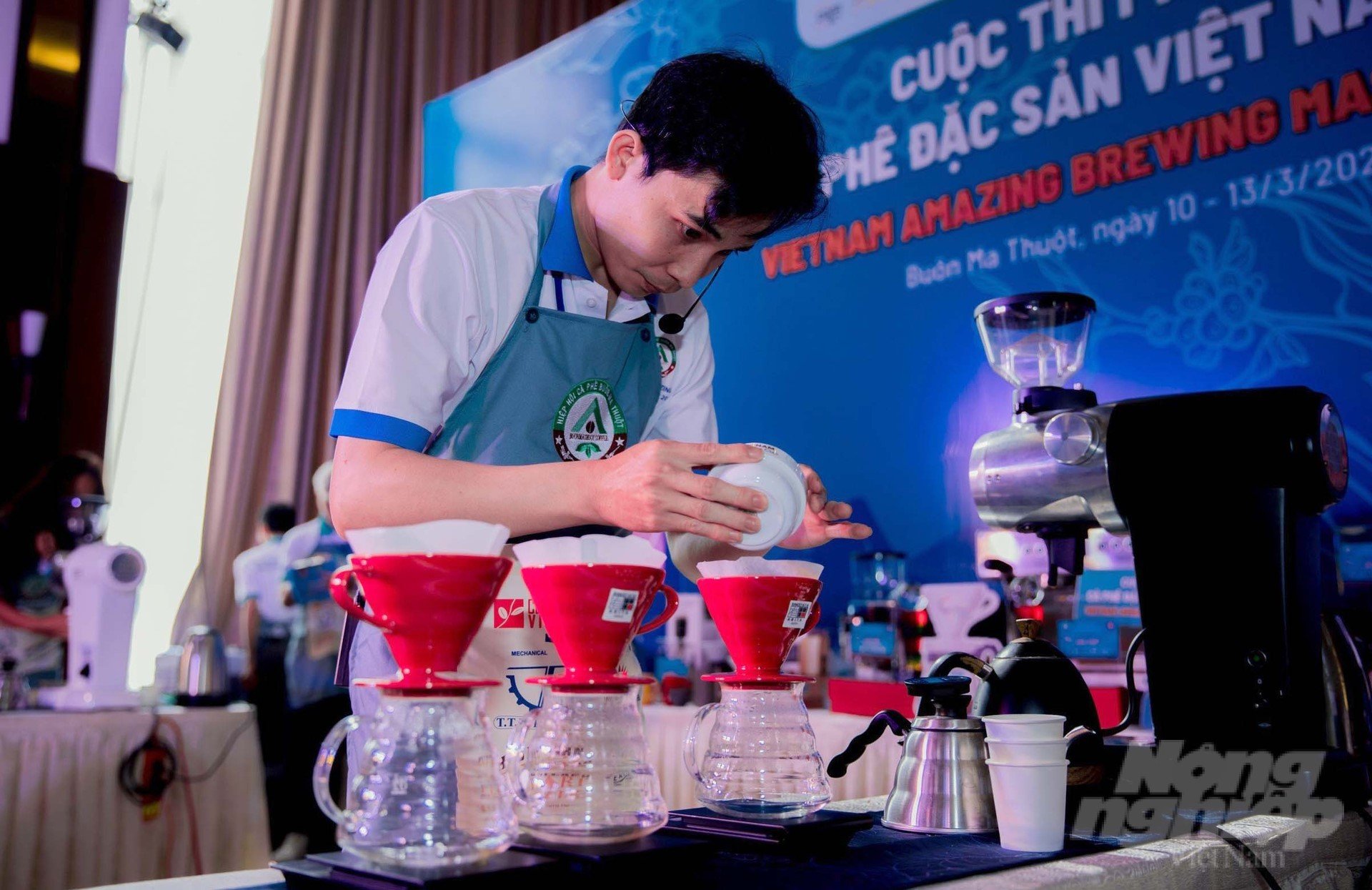June 16, 2025 | 23:21 GMT +7
June 16, 2025 | 23:21 GMT +7
Hotline: 0913.378.918
June 16, 2025 | 23:21 GMT +7
Hotline: 0913.378.918
Faced with the market’s openness for the Robusta coffee industry, coffee production and trading enterprises in Lam Dong have been focusing on building and developing linkage chains and organizing sustainable raw material areas. Mr. Mai Ngoc Dinh, in charge of sustainable coffee chain production at Tam Trinh Coffee Import-Export Company (Gia Lam commune, Lam Ha district,Lam Dong), said that the company is now associating with 3,000 farmer households all over the province for coffee production. Every year, the company produces, processes, and supplies about 30,000–40,000 tons of coffee to the market.

Tam Trinh Coffee Import-Export Company (Lam Ha, Lam Dong) is associating with 3,000 households in the province to build high-quality coffee raw material areas. Photo: Minh Hau.
Mr. Mai Ngoc Dinh said that from 2022, the market will tend to switch to using products from Vietnam's Robusta coffee, which is a great opportunity for enterprises. The coffee price has also increased gradually, helping coffee growers feel secure in their production. In order to meet market demand, Tam Trinh Coffee Import-Export Company also aims to expand the raw material area and increase the production size, especially focusing on developing high-quality coffee material areas according to standards like 4C and Rainforest Alliance.
Ms. Nguyen Thi Tho from Nguyen Phuc Nong Co., Ltd. (a coffee production unit with the Got Coffee brand, located in Loc Thanh commune, Bao Lam district, Lam Dong) said that in the past years, foreign partners have not appreciated the locality’s Robusta coffee. However, recently, they have changed, paying more attention to Robusta products and especially giving preference to Vietnam’s high-quality Robusta.
"Previously, we only produced and met domestic market demand. But recently, partners from the US market have worked with us and placed orders. We produce high-quality and organic Robusta, so ensuring the product sources according to the order is very important. That means we will have to maintain, expand linkages, and build a larger raw material area to be able to meet that," said Ms. Nguyen Thi Tho.

Nguyen Phuc Nong Co., Ltd. (a coffee production unit with the Got Coffee brand, located in Loc Thanh commune, Bao Lam district, Lam Dong) builds an organic coffee area and implements a modern processing process to ensure product quality. Photo: Minh Hau.
According to a representative of Got Coffee, the company is associating with 15 farmer households in Bao Lam district to produce organic Robusta coffee; working with enterprises and farms with a size of hundreds of hectares to cooperate in developing raw material areas to meet market demand. Currently, the company’s Robusta products are appreciated and well received by the market because the company implements a selective picking process, harvesting 100% ripe fruit to put into the processing and roasting process according to the US’s SCA standards without using flavorings to preserve the true taste of coffee.
Mr. Vu Quoc Quan, COB and Director of Minh Toan Loi Agricultural Production and Trading Services Cooperative, said that it is increasingly difficult for coffee farming due to climate change and highly rising input costs. Therefore, in response to these problems, the cooperative has encouraged member households and associated households to organize intercropping and implement organic processes. In particular, intercropping will increase the shade for coffee, improve income, create a more sustainable garden ecosystem, improve crop quality, and increase the quality of coffee products.
In Dak Lak province, coffee cooperatives and enterprises are also focusing on producing and improving product quality to meet market demand. According to Mr. Vu Quoc Quan, COB and Director of Minh Toan Loi Agricultural Production and Trade Services Cooperative (Krong Nang District, Dak Lak), the cooperative currently has more than 500ha of Robusta coffee, which is being sold to exporters such as Simexco Daklak, Dakman.

Cooperatives and enterprises in Dak Lak are focusing on producing high-quality coffee to meet market demand. Photo: Minh Quy.
According to Mr. Vu Quoc Quan, the increase in the world's imports of Robusta coffee is a positive signal for Vietnam's coffee industry. For a long time, the cooperative has built a sustainable production process and always aims for the elements of "ethics –conscience – creativity", especially applying science and technology to production to improve product quality.
"The cooperative always requires members to minimize the use of chemical fertilizers and pesticides. Instead, use organic fertilizers, microorganisms, and biological products for pest and disease control. We also improve the quality by applying the processes of ripe picking, selecting, and adapting to climate change. We also regularly train to change habits and improve farming skills for people. The cooperative is now focusing on implementing a model of cultivating 4ha of organic coffee to improve the product quality and value," said Mr. Vu Quoc Quan.
Meanwhile, Eatu Fair Agricultural Service Cooperative (Buon Ma Thuot City, Dak Lak) has also embarked on producing according to standard processes. Mr. Nguyen Dinh Trong, Director of Eatu Fair Agricultural Service Cooperative, said that the unit currently creates a production linkage with households in the area, with a total area of up to 260ha. The production of high-quality, sustainable coffee has been an interest of the cooperative for many years.

Coffee production units in Dak Lak regularly organize and participate in coffee quality competitions to assess their capacity and improve their level of production and processing. Photo: Minh Quy.
In order to sustainably develop the Robusta coffee industry, Eatu Fair Agricultural Service Cooperative participates in specialty coffee processing competitions every year. Along with that, this unit organizes to donate TR4 coffee seeds to farmers to improve efficiency. "In order to increase the quantity of high-quality coffee to meet export requirements, the cooperative also takes care of, picks over 80% of the ripe fruit, and implements modern preliminary and processing processes. To encourage the movement of high-quality production, the cooperative will organize an additional bonus for member households when they carry out a selective, well-processed harvest of ripe fruit," said Mr. Nguyen Dinh Trong.
Mr. Nguyen Dinh Trong, Director of the Eatu Fair Agricultural Service Cooperative, said, “I often participate in international fairs to promote the cooperative’s coffee. Many people enjoyed our coffee, and they said that the coffee is very delicious. Many foreigners expressed that they did not expect Vietnamese coffee to be of such high quality.
Regarding the open market for the Robusta coffee industry, according to Mr. Nguyen Dinh Trong, this is a great opportunity but also a big challenge for the Vietnamese coffee industry. He said, "We need to have a plan to develop and improve the quality further. In the future, the world market, especially the Italian market, will only buy coffee with Fair Trade certification combined with organic farming. Therefore, we need to have a long-term strategy to improve quality."
Translated by Huyen Vu Thu
![Turning wind and rain into action: [4] Bringing climate bulletins to remote and isolated areas](https://t.ex-cdn.com/nongnghiepmoitruong.vn/608w/files/linhnhp/2025/06/14/1152-z6704423696987_15fd32ffc26d590d204d520c9dac6786-nongnghiep-151141.jpg)
(VAN) The Vietnam Agriculture and Nature Newspaper interviewed Mr. Vu Thai Truong, Acting Head of Climate Change and Environment at UNDP Vietnam, to gain deeper insight into how climate bulletins are delivered to farmers.

(VAN) In Tien Giang, a high-tech shrimp farm has developed a distinctive energy-saving farming model that has yielded promising results.
![Turning wind and rain into action: [3] 300.000 farmers benefit from agro-climatic bulletins](https://t.ex-cdn.com/nongnghiepmoitruong.vn/608w/files/news/2025/06/12/e5a48259d6a262fc3bb3-nongnghiep-125122.jpg)
(VAN) The agro-climatic bulletin has become a valuable tool for farmers in the Mekong Delta. After more than five years of implementation, the initiative is gradually being expanded nationwide.
![Turning wind and rain into action: [2] Providing forecasts to the people](https://t.ex-cdn.com/nongnghiepmoitruong.vn/608w/files/news/2025/06/12/e5a48259d6a262fc3bb3-nongnghiep-103927.jpg)
(VAN) In addition to improving the quality of hydrometeorological forecasts, putting forecast bulletins into practical use is crucial for production and disaster prevention.

(VAN) Blue carbon is receiving attention for its rapid absorption capacity and vast potential. It represents a promising nature-based solution to respond to climate change.
/2025/06/11/3507-1-161904_583.jpg)
(VAN) Seagrass beds and coral reefs serve as 'cradles' that nurture life in the ocean depths, creating rich aquatic resources in Vietnamese waters.
![Turning wind and rain into action: [1] Forecasting for farmers](https://t.ex-cdn.com/nongnghiepmoitruong.vn/608w/files/news/2025/06/11/e5a48259d6a262fc3bb3-nongnghiep-111919.jpg)
(VAN) Weather is no longer just a matter of fate. Forecasts have now become an essential companion for farmers in every crop season.